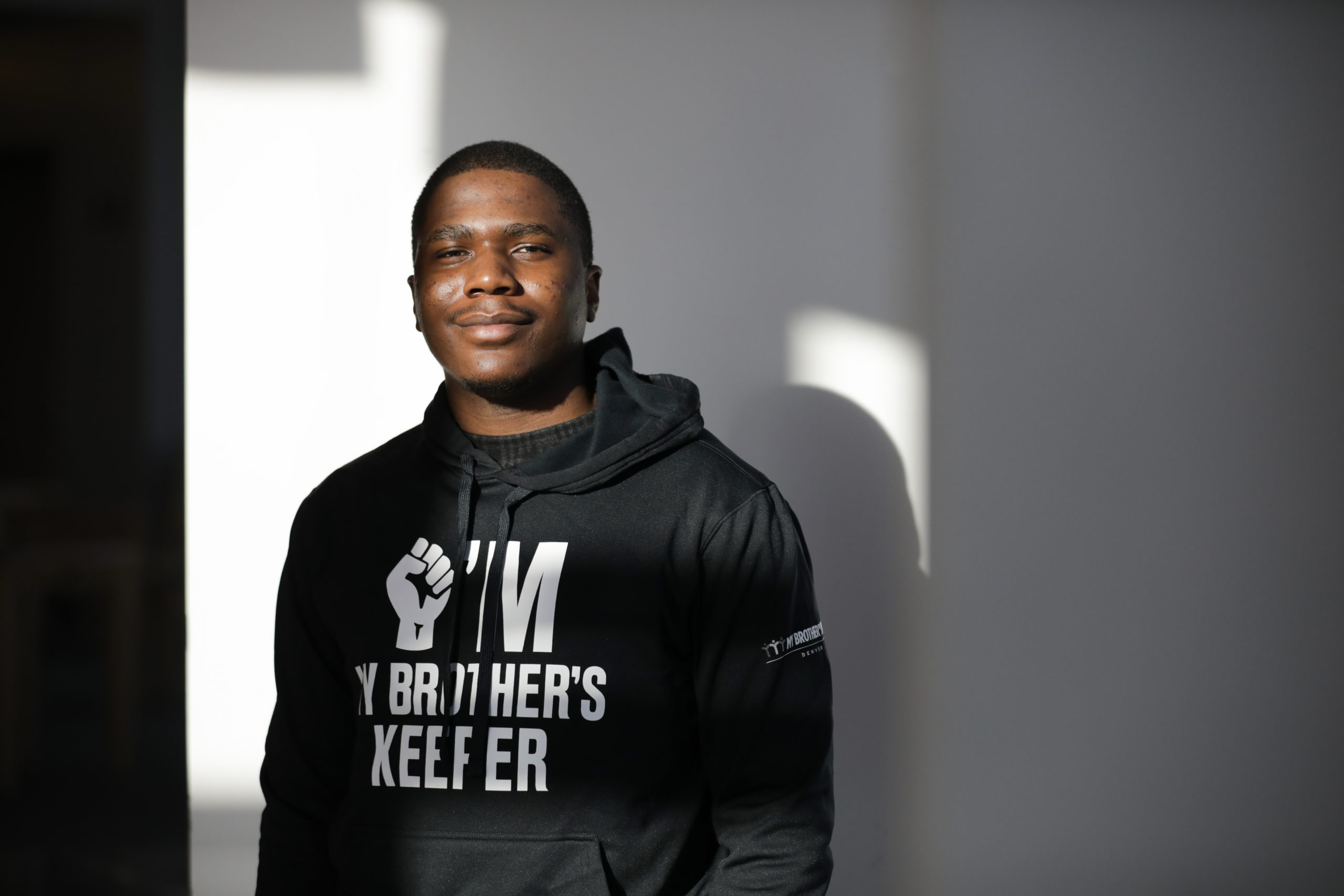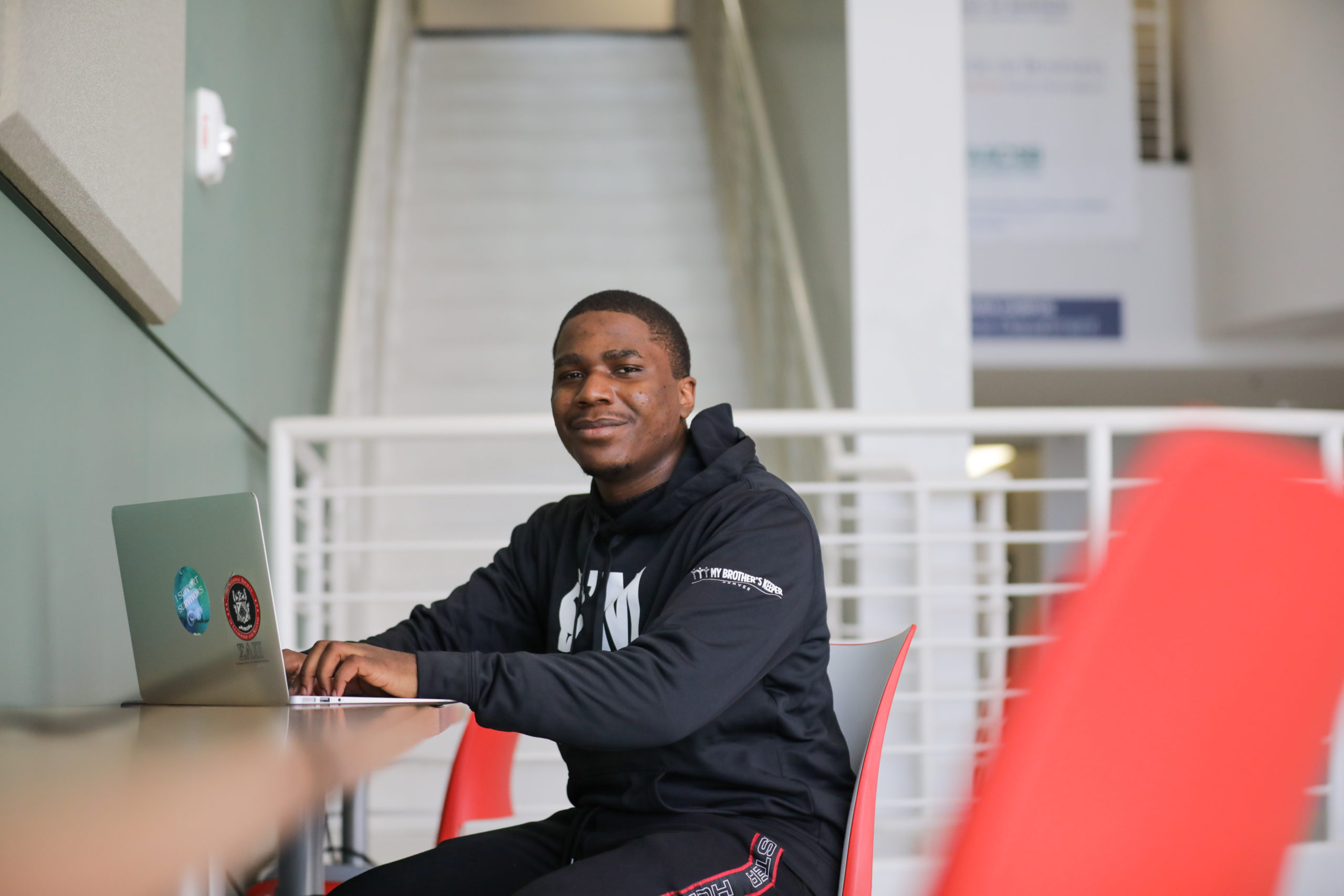This story originally appeared on MSU Denver RED.
Emanuel Walker, Reisher Scholar, Liberian refugee, and 2021 My Brother’s Keeper Emerging Leader, is on a mission to make higher education more accessible to all students.
If you want to understand the equity gap in education, do the numbers.
Today, nearly 75% of Colorado jobs require some sort of postsecondary education, along with 97% of in-demand and well-paying “top jobs.”
About 65% of white Coloradans meet that threshold, with some education beyond high school, compared with 44% of the state’s Black population, a difference of more than 20 percentage points.
There’s nothing abstract about those stats for Emanuel Walker.
“I was that person struggling, part of a demographic that’s often looked over,” said the Metropolitan State University of Denver junior, who came to Colorado as a refugee from Liberia. “The world is more diverse, and it’s up to us to build systems and leaders who reflect that – or else we’re going to have a mess.”

He’s doing something about it, too. As a computer information systems student, Walker is developing ways to increase retention and graduation rates among Black students through experiential learning, research and providing digital “badges” to demonstrate specific skills.
That work is drawing commendation from leaders across the city and the state.
“One thing no one can take away from you is your education,” said Denver Mayor Michael Hancock, who honored Walker as part of the 2021 My Brother’s Keeper Emerging Leader award ceremony. “Looking ahead, our city, with you leading the way, is going to be all right.”
Walker served as an advisor on the state Department of Higher Education’s Colorado Equity Champions Coalition and contributed to the department’s recently released Report on Educational Equity: Creating a Colorado for All. The report offers strategies for erasing the equity gap and meeting the state’s goal of 66% of Coloradans ages 25-34 attaining some level of post-secondary education by 2025.
“Addressing equity gaps is critical to our economic-health and workforce-development goals in the state,” said Shelley Banker, senior advisor to the Office of Educational Equity for the Colorado Department of Higher Education. “Meeting the 66% attainment goal … is our North Star, and that requires talking about race, ability, gender – all the experiences and identities students bring with them to our campuses.”
Passion for technology
The commitment to equitable advancement is personal for Walker. He arrived in the United States in 2004, fleeing civil war in Liberia. Coming from a place where education was primarily reserved for a privileged elite few, Walker credits his mother for prioritizing the potential of education for change.
Plugging into the American educational system wasn’t easy. Finishing high school with a 1.6 GPA, Walker wondered what his path forward would be.
“I thought I let my mom down and that my life was over,” Walker said. “I was asking, ‘What are my opportunities now? Where am I going to go?”
He found his answer at MSU Denver.

After earning an associate’s degree at Community College of Denver, Walker discovered a passion for technology – and a place for him on the Auraria Campus. At MSU Denver, he continued to build meaningful relationships with his community and connect with mentors. Support from the Reisher and Puksta scholarship programs helped him “become the person I am today,” Walker said.
Walker’s successes are a testament to his unrelenting tenacity and advocacy for others. As chair of the State Student Advisory Council, he represented more than 137,000 Colorado community-college students at the state and national level, launching a student-fee referendum initiative and raising funds to benefit his constituents.
He is a vigorous proponent of dual enrollment, such as MSU Denver’s Colorado ProStart program through the School of Hospitality and Colorado Restaurant Association, which allows more than 900 high school students to earn college credit before setting foot on campus.
The approach is resonating. As outlined in the equity report, Black or African American participation in concurrent-enrollment programs increased by 75.8%, from 20.5% in 2014 to 36.2% in 2018, second only to American Indian/Alaska Natives (100.8% increase) among ethnic-group breakdowns.
“We need to continue to reach out to students from the beginning of their journeys to help set them up for academic success,” Walker said. “We also need to think about their personal and professional development – that’s how you create scholars.”
Walker’s plan is to work as an information-technology project manager within education, continuing to focus on closing the equity gap and shaping policy for students like him. Ultimately, he hopes to return to Liberia and apply what he’s learned here to the education system in his native country.
It’s a natural fit for someone who used to take apart computers that his mom would buy to understand how they work and put them back together. And though he was also accepted into more brand-name schools such as Columbia University and USC, he reaffirmed his choice when reflecting on how welcomed he felt during orientation for the Puksta Scholars program.
“That moment I knew I was in the right place,” Walker said. “I thought, ‘Wow, this is a family that cares about me and is invested in my success; this is amazing.
“That’s when I knew I had to go to MSU Denver, where I belong.”